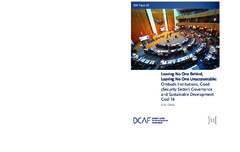Приказ основних података о документу
Leaving No One Behind, Leaving No One Unaccountable: Ombuds Institutions, Good (Security Sector) Governance and Sustainable Development Goal 16
| dc.creator | Glušac, Luka | |
| dc.date.accessioned | 2023-12-18T09:41:12Z | |
| dc.date.available | 2023-12-18T09:41:12Z | |
| dc.date.issued | 2023 | |
| dc.identifier.isbn | 978-1-914481-36-9 | |
| dc.identifier.uri | http://rifdt.instifdt.bg.ac.rs/123456789/3666 | |
| dc.description.abstract | This study explores how ombuds institutions, here defined as independent oversight bodies that receive complaints and investigate matters pertaining to the protection and promotion of human rights and/or maladministration, can contribute to the realization of the 2030 Agenda on Sustainable Development and its Sustainable Development Goals (SDGs). The focus of the study is on SDG 16, because it is devoted to promoting peaceful and inclusive societies for sustainable development, providing access to justice for all, and building effective, accountable, and inclusive institutions at all levels. In other words, this SDG is aligned the most with the mandate and functions of ombuds institutions. Another reason for the focus on SDG 16 is the attempt of this study to add the security sector into the equation, where and when possible. This is done by connecting the SDG framework with the concept of security sector governance (SSG) and security sector reform (SSR), and the principles that guide them. With their unique position in-between three branches of power, the mandate to oversee public administration (including the security sector) and protect human rights, ombuds institutions are well-placed to play an important role in national efforts to fulfil the SDGs. However, the key argument of this research is that their main role should be to support and contribute, not to lead. Achieving the SDGs calls for a strong web of institutions and partnerships. Ombuds institutions (and other forms of national human rights institutions: NHRIs) are central national human rights actors but must not be expected to lead the realization of human rights-based SDGs. They cannot be the only game in town. In fact, for a number of the SDG 16 targets, ombuds institutions should primarily serve as accountability mechanisms. They should work with, pressure, and make public administration accountable, in cases when the administration as the primary duty-bearer fails to protect the rights of citizens and when their actions fall short of the standards needed to achieve the SDGs. This particularly applies to security sector institutions, considering that their actions, particularly of the police and security services, may interfere with human rights in an unparalleled way, as they are authorized to use special measures to penetrate deep into the private lives of citizens. The central assumption of this study is that ombuds institutions can contribute to achieving all SDG 16 targets. To demonstrate how this could be done in practice, the research explores the role of ombuds institutions in achieving SDG 16 by looking at both implementation and accountability. The former is captured under the title ‘leaving no one behind’ and the latter under ‘leaving no one unaccountable.’ Leaving no one behind is a central credo of the 2030 Agenda. It is highly relevant for SDG 16, as well as SSG/R, due to the centrality of the principles of responsiveness and participation, which posit that the security sector should respond to the security needs of all, and conversely, all should be involved, to the extent possible, in the development of security policies. SDG 16 stresses the need for strong institutions that are built on respect for human rights, effective rule of law, and good governance at all levels. It is arguably one of the most ambitious goals in the 2030 Agenda because it is not simply a goal by itself but also an enabler for the achievement of other goals. Nonetheless, as this study demonstrates, many SDG 16 targets are rather vague, and limited guidance exists on how to measure and achieve them, especially in fragile contexts. This study thus provides guidance and recommendations to ombuds institutions and other actors on how to best support each other in achieving SDG 16. | sr |
| dc.language.iso | en | sr |
| dc.publisher | London : Ubiquity Press | sr |
| dc.publisher | Geneva : DCAF- Geneva Centre for Security Sector Governance | sr |
| dc.rights | openAccess | sr |
| dc.rights.uri | https://creativecommons.org/licenses/by-nc/4.0/ | |
| dc.source | Ubiquity Press and DCAF | sr |
| dc.subject | Ombuds institutions | sr |
| dc.subject | Human rights | sr |
| dc.subject | Security sector governance | sr |
| dc.subject | Sustainable development goals | sr |
| dc.subject | Good governance | sr |
| dc.subject | National Human Rights Institutions | sr |
| dc.title | Leaving No One Behind, Leaving No One Unaccountable: Ombuds Institutions, Good (Security Sector) Governance and Sustainable Development Goal 16 | sr |
| dc.type | book | sr |
| dc.rights.license | BY-NC | sr |
| dc.identifier.doi | https://doi.org/10.5334/bcw | |
| dc.type.version | publishedVersion | sr |
| dc.identifier.fulltext | http://rifdt.instifdt.bg.ac.rs/bitstream/id/13260/leaving-no-one-behind-leaving-no-one-unaccountable.pdf |

